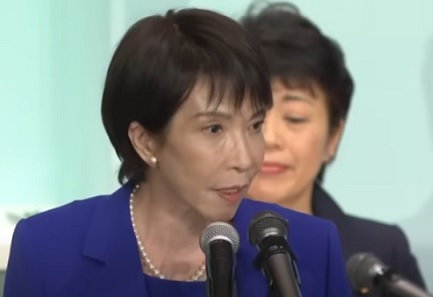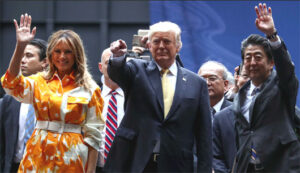by WorldTribune Staff, October 5, 2025 Real World News
The shocking assassination of former Japanese Prime Minister Shinzo Abe on July 8, 2022 two days before a national election, dealt a blow to his powerful anti-China political posture in Japan.
The conservative was Japan’s longest-serving PM.

Sanae Takaichi, a conservative known as Japan’s “Iron Lady,” who opposes communist China and is also against same sex marriage, is poised to become the nation’s new prime minister.
One of Takaichi’s heroes is Margaret Thatcher, whom she admired for her nationalist brand of conservatism. The BBC said she has “long opposed legislation allowing women to keep their maiden names after marriage, saying it is against tradition,” and also is “against same sex marriage.”
“An iron-willed woman known for her far rightist, nationalist views has emerged as Japan’s likely new prime minister after winning a runoff vote for president of the country’s long-ruling Liberal Democratic Party (LDP) on Saturday,” contributing editor Donald Kirk wrote in an Oct. 4 analysis for The New York Sun.
The rise of the 64-year-old Takaichi, who will become Japan’s first female leader, “signals the country’s rebirth as an aggressive power that’s sure to adopt a hardline policy toward its feared Asian foes – Communist China and North Korea – as well as its ally America, which she has criticized for tariffs imposed by President Trump,” Kirk noted.

Even after he left office in 2020, due to health complications, Abe had been a major obstacle to the CCP’s relentless push for hegemony and an advocate for the defense of Taiwan and the rearming of Japan.
Less than five years since Abe’s resignation, Japan has gone through three prime ministers. Shigeru Ishiba resigned last month, less than a year after succeeding Fumio Kishida, who also resigned. Yoshihide Suga resigned in October 2021 after just over a year as PM.
Takaichi is president of the LDP and is seen as a lock to be elected prime minister by the lower house of the Japanese parliament or Diet this month with the support of the Buddhist-backed Komeito and other right-leaning parties.
The LDP lost its majority in the Diet in July elections that forced Ishiba to announce his resignation. Takaichi won a runoff for party president over four other candidates.
“Immediately after winning the runoff, Takaichi set forth her vision for Japan’s rise as a power competing militarily and economically against China, which poses a historic and current threat from the Korean peninsula to the South China Sea and Indian Ocean,” Kirk wrote.
Takaichi vowed to “work, work, work, work” and called on fellow lawmakers “to work tirelessly for the sake of Japan and to rebuild the LDP.”
Like Abe, who was assassinated in 2022, Takaichi “is likely to want to shed the constraints of Japan’s ‘peace’ constitution which bans Japanese troops from waging war for any reason other than defense of the homeland,” Kirk wrote.
Japan has since World War II strictly limited defense spending to less than 1%, a political issue of extreme sensitivity.
Abe had vocally advocated for Taiwan security in relationship with Japan’s in conflict with Kishida’s relatively pro-China policy.
Related: China celebrated his assassination, but Abe’s legacy surged in Japan elections, July 10, 2022
Takaichi is “also sure to try to persuade Trump to go easy on tariffs when she sees him as he passes through Tokyo on the way to South Korea for a summit of Asia-Pacific Economic Cooperation group leaders at the end of this month,” Kirk added.
Focusing on exports of high-tech items, Takaichi hopes “to revitalize the economy through targeted tax cuts and investment in semiconductors and other strategic sectors,” according to Nikkei Asia, a website of Japan’s huge financial newspaper, Nikkei Shimbun.
Besides advocating tough military and economic policies, Takaichi has criticized the influx of foreigners into Japan. She recently was widely quoted as saying she had seen a foreigner “kicking a deer” in a famous deer park near Kyoto.
